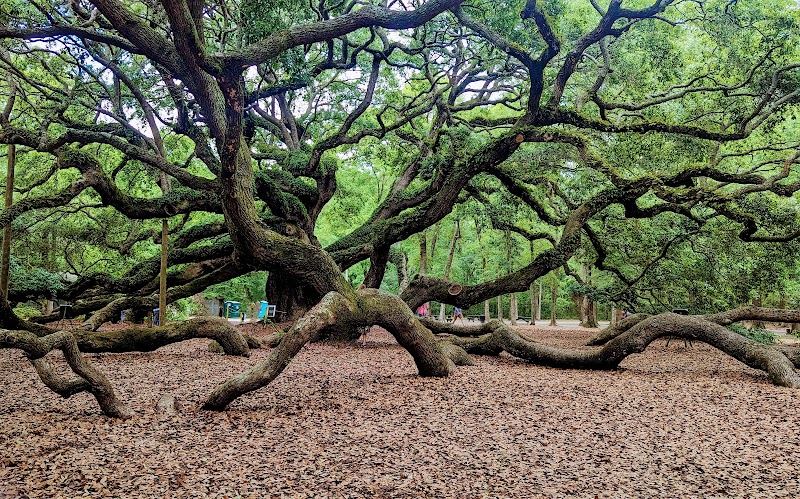
eco-tours near Charleston, South Carolina
Eco-tours near Charleston, South Carolina, offer hands-on adventures through tidal marshes, longleaf pine forests, and coastal waterways. Perfect for anyone seeking immersive wildlife encounters combined with education, these tours bring nature's fierce vitality to life while highlighting the importance of conservation.
Check Tide Times Before Booking
Many eco-tours depend on tide schedules since marsh and river access changes dramatically. Plan around high tides for optimal paddling conditions and visible wildlife activity.
Wear Waterproof Footwear
Trails around tidal creeks can be muddy and wet, so sturdy waterproof hiking sandals or boots improve comfort and safety during your explorations.
Bring Bug Repellent
Mosquitoes and biting flies thrive in warm months, especially near water. Use a DEET-free repellent to protect yourself without disturbing the ecosystem.
Pack Water and Snacks
Tours typically last between two to four hours with limited stops. Staying hydrated and energized keeps you focused on nature's details without fatigue setting in.
eco-tours near Charleston, South Carolina
Explore Eco-Tours Near Charleston, South Carolina: Adventure Meets Conservation
Charleston's coastal charm isn't just about historic streets and southern cuisine—it's also a gateway to vibrant eco-tours that invite travelers to engage directly with the Lowcountry's fiercely living ecosystems. Eco-tours near Charleston, South Carolina, unlock access to salt marshes, tidally driven creeks, and longleaf pine forests, where every step challenges and rewards visitors with immersive nature experiences.
These tours marry adventure with education, giving you a chance to see the natural forces at play—muddy rivers dare you to cross, while mangrove roots twist and turn in lessons about survival and resilience. Whether paddling a kayak through calm tidal rivers or hiking boardwalk trails rich with bird calls and swaying grasses, eco-tours provide hands-on ways to connect with Charleston’s unique environment responsibly.
The practical side is equally important. Guided eco-tours often last two to four hours, making them suitable for casual explorers and outdoor enthusiasts alike. Light to moderate physical activity is typical; bring sturdy footwear for marshy terrains and layered clothing for changing coastal weather. Many tours include expert naturalists who explain the intricate relationships between flora and fauna, shedding light on why conservation matters here.
Planning your eco-tour means considering tides and seasons. Spring and early fall bring balanced temperatures and active wildlife, while summer demands hydration and sun protection as mosquitos increase with humidity. Winter tours offer quieter marshlands and a chance to spot migratory birds making their stopovers.
For travelers staying nearby, Charleston offers a perfect base with plenty of accommodations and the cultural amenities that round out an adventurous day. From here, you can explore more adventures in Charleston, South Carolina, with options ranging from historic walking tours to paddling excursions. This landing page connects you to the best of these experiences, giving you all the details to prepare for a trip that's as educational as it is exhilarating.
Whether you're a seasoned eco-adventurer or testing waters for the first time, eco-tours near Charleston, South Carolina, deliver an experience both grounded in nature and elevated by knowledge. Dive into an adventure that respects the fierce life of the Lowcountry and leaves you better acquainted with the environment that shapes this vibrant region.
Nearby Trips
All Adventures
Boat Charters
Water Activities
Adventures near Charleston, South Carolina
Discover the unique and memorable adventures that make Charleston, South Carolina special.
Frequently Asked Questions
Are eco-tours near Charleston suitable for children?
Yes, many eco-tours are family-friendly, with easy to moderate physical requirements and guided instruction ideal for older children. However, check age restrictions with tour operators before booking.
Do I need prior kayaking experience for water-based eco-tours?
Most operators provide basic paddling instruction and safety gear, making these tours accessible to beginners. Experienced guides ensure a safe trip even for first-time kayakers.
What wildlife am I likely to see on these eco-tours?
Expect to see wading birds like herons and egrets, migratory songbirds, fiddler crabs on the mudflats, and occasionally river otters or dolphins near the waterways.
How can I prepare for changing weather conditions on tours?
Layer your clothing to adapt to humidity or sea breezes, bring rain gear during spring and summer, and always check local forecasts prior to departure.
Are eco-tours environmentally responsible?
Yes, reputable eco-tour companies adhere to strict guidelines that prioritize conservation and minimal wildlife disturbance, often contributing to local preservation efforts.
Is transportation to tour departure points provided?
Some tour operators offer shuttle services from central Charleston; others require private transport. Confirm details when booking to plan your arrival accordingly.
Recommended Gear
Waterproof Hiking Shoes
Protects feet from mud and shallow water on marsh trails while providing needed traction.
Lightweight Waterproof Jacket
Spring showers can arrive unexpectedly; a packable jacket keeps you dry without bulk.
Insect Repellent
Prevents bites from mosquitoes and other insects prevalent in warmer months near water.
Sun Protection (Hat & Sunscreen)
Long hours outdoors require sun protection to avoid burns and dehydration.
Local Insights
Hidden Gems
- "Explore the secluded marsh boardwalks in the Francis Marion National Forest area for less crowded wildlife viewing."
- "Look for rarely visited salt ponds around Folly Beach, home to unique crustaceans and bird species."
Wildlife
- "Eastern diamondback rattlesnakes inhabit the pine forests—observe from a distance."
- "The elusive marsh rice rat scurries along the creek banks, active at dusk."
History
"The Lowcountry’s tidal marshes were once critical to the rice plantations economy. Their preservation today honors the landscape’s complex cultural and ecological legacy."
